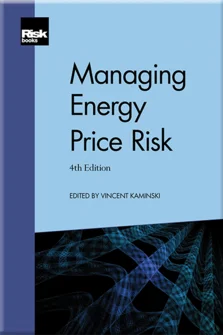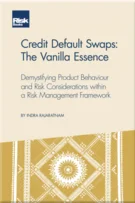Energy Real Options: Valuation and Operations
Nicola Secomandi and Duane J Seppi
Introduction
May You Live in Interesting Times
The Dodd–Frank Act and its Impact on the Energy Industry
Assessing Regulatory Risk
Introduction to Price-Reporting Agencies
Fundamental Data in Energy Markets
European and Asian Natural Gas Market Developments – Swamped by the Present?
US Natural-Gas Markets
Managing Oil Price Risk: Dealing with the Time-Varying Relationship between the Price of Oil and Fundamentals
Electricity Markets: US
European Electricity Markets: Part I
European Electricity Markets: Part II
Coal
Energy Real Options: Valuation and Operations
Commodity-Based “Swing” Options
Gas Storage Pricing and Hedging
Valuation and Risk Management of Physical Assets
Arbitrage-Free Valuation of Energy Derivatives
Introduction to Value-at-Risk
Introduction to Portfolio Value-at-Risk
Introduction to Default Risk and Counterparty Credit Modelling
Credit Risk in Power and Gas Markets
Credit in the Energy Markets
The ability to recognise and exploit flexibility is a fundamental source of economic value. In finance, flexibility is called an option. Optionality comes in many forms. Some options, like bond covenants and exchange-traded calls and puts, are legal constructs created by contractual counterparties to facilitate risk transfers. However, much of the optionality in the global economy is not contractual but operational. Growth options to enter a new market or to expand existing capacity, timing options to switch from R&D to production, and physical optionality in factories and other production infrastructure are known as real options. There is a large literature on pricing and managing various types of options.11ixit and Pindyck (1994) and Trigeorgis (1996) are seminal introductions to real options. Grenadier (1996, 2002) introduce the concept of timing options and multi-party entry games. Geman (2005) is an introduction to commodity derivatives in general, and Clewlow and Strickland (2000), Eydeland and Wolyniec (2003) and, more recently, Secomandi and Seppi (2014) are introductions to energy derivatives in particular.
Storage, transportation, processing, refining and production of
Copyright Infopro Digital Limited. All rights reserved.
As outlined in our terms and conditions, https://www.infopro-digital.com/terms-and-conditions/subscriptions/ (point 2.4), printing is limited to a single copy.
If you would like to purchase additional rights please email info@risk.net
Copyright Infopro Digital Limited. All rights reserved.
You may share this content using our article tools. As outlined in our terms and conditions, https://www.infopro-digital.com/terms-and-conditions/subscriptions/ (clause 2.4), an Authorised User may only make one copy of the materials for their own personal use. You must also comply with the restrictions in clause 2.5.
If you would like to purchase additional rights please email info@risk.net










